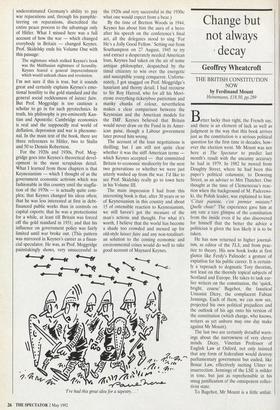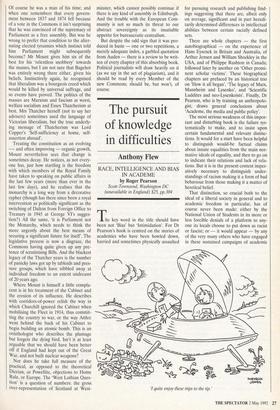Change but not always decay
Geoffrey Wheatcroft
THE BRITISH CONSTITUTION NOW by Ferdinand Mount Heinemann, £18.50, pp.289 B etter lucky than right, the French say, and there is an element of luck as well as judgment in the way that this book arrives just as the constitution is a serious political question for the first time in decades, how- ever the election went. Mr Mount was not here at The Spectator to predict last month's result with the uncanny accuracy he had in 1979. In 1982 he moved from Doughty Street, where he had been this paper's political columnist, to Downing Street, as an adviser to Mrs Thatcher. One thought at the time of Clemenceau's reac- tion when the background of M. Paderews- ki, the Polish leader, was explained to him: 'C'etait pianiste, c'est premier ministre? Queue chute!' The experience gave him at any rate a rare glimpse of the constitution from the inside even if he also discovered for himself that the better the advice a politician is given the less likely it is to be taken.
He has now returned to higher journal- ism, as editor of the TLS, and from prac- tice to theory. His new book looks at first glance like Ferdy's Palinode: a gesture of expiation for his public career. It is certain- ly a reproach to dogmatic Tory theorists, not least on the thornily topical subjects of Scotland and Europe. He takes to task ear- lier writers on the constitution, the 'quick, bright, coarse' Bagehot, the fanatical Unionist Dicey, the complacent Fabian Jennings. Each of them, we can now see, projected his own political prejudices and the outlook of his age onto his version of the constitution (which charge, who knows, writers as yet unborn may one day make against Mr Mount).
The last two are certainly dreadful warn- ings about the narrowness of very clever minds. Dicey, Vinerian Professor of English Law at Oxford, not only insisted that any form of federalism would destroy parliamentary government but ended, like Bonar Law, effectively inciting Ulster to insurrection. Jennings of the LSE is milder in tone, but just as reprehensible in his smug justification of the omnipotent collec- tivist state.
To Bagehot, Mr Mount is a little unfair. Of course he was a man of his time; and when one remembers that every govern- ment between 1837 and 1874 fell because of a vote in the Commons it isn't surprising that he was convinced of the supremacy of Parliament as a free assembly. But was he wrong to prefer that condition to the alter- nating elected tyrannies which instinct told him Parliament might subsequently become? Mr Mount gives him six of the best for his 'relentless snobbery' towards the masses, but I am not sure that Bagehot was entirely wrong there either, given his beliefs. Instinctively again, he recognised that liberalism was a bourgeois creed which would be killed by universal suffrage, and so events have proved. The politics of the masses are Marxism and fascism at worst, welfare socialism and Essex Thatcherism at best. Mrs Thatcher herself (not to say her advisers) sometimes used the language of Victorian liberalism, but the true underly- ing message of Thatcherism was Lord Copper's 'Self-sufficiency at home, self- assertion abroad'.
Treating the constitution as an evolving — and often improving — organic growth, Mount nevertheless sees that change is sometimes decay. He notices, as not every- one has, just how startling is the freedom with which members of the Royal Family have taken to speaking on public affairs in the last few years (more than ever in the last few days), and he realises that the monarchy is a long way from a decorative cypher (though has there since been a royal intervention as politically significant as the switching of Dalton from Foreign Office to Treasury in 1945 at George VI's sugges- tion?) All the same, 'it is Parliament not the Monarchy, which needs to think the more urgently about the best means of securing a significant future for itself'. The legislative process is now a disgrace, the Commons having quite given up any pre- tence of scrutinising Bills. And the blackest legacy of the Thatcher years is the number of panicky laws got up by tabloids and pres- sure groups, which have nibbled away at individual freedom to an extent undreamt of 20 years ago.
Where Mount is himself a little compla- cent is in his treatment of the Cabinet and the erosion of its influence. He describes with corridors-of-power relish the way in which Churchill ignored the Cabinet when mobilising the Fleet in 1914, thus commit- ting the country to war, or the way Attlee went behind the back of his Cabinet to begin building an atomic bomb. This is an ornithologist who describes the plumage but forgets the dying bird. Isn't it at least arguable that we should have been better off if England had kept out of the Great War, and not built nuclear weapons?
Nor does he take full measure of the practical, as opposed to the theoretical Diceian, or Powellite, objections to Home Rule, or Europe. The 'West Lothian Ques- tion' is a question of numbers: the gross over-representation of Scotland at West-
minster, which cannot possibly continue if there is any kind of assembly in Edinburgh. And the trouble with the European Com- munity is not so much its threat to our abstract sovereignty as its insatiable appetite for bureaucratic centralism.
But despite the odd sign that it was pro- duced in haste — one or two repetitions, a merely adequate index, a garbled quotation from Auden — there is a review to be writ- ten of every chapter of this absorbing book. political journalists will draw heavily on it (as we say in the act of plagiarism), and it should be read by every Member of the new Commons; should be, but won't, of course.



















































 Previous page
Previous page